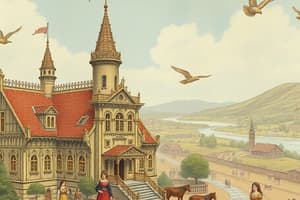Podcast
Questions and Answers
Which event significantly diminished Spain's dominance in North America?
Which event significantly diminished Spain's dominance in North America?
- The establishment of Jamestown
- The arrival of enslaved Africans in Virginia
- The founding of Quebec
- The defeat of the Spanish Armada (correct)
The House of Burgesses was established in 1619 and marked the beginning of representative government in Virginia.
The House of Burgesses was established in 1619 and marked the beginning of representative government in Virginia.
True (A)
What crop did John Rolfe cultivate that became critical for the Jamestown colony?
What crop did John Rolfe cultivate that became critical for the Jamestown colony?
tobacco
The first permanent English settlement in North America was established in _______.
The first permanent English settlement in North America was established in _______.
Match the following colonies with their founders or significant figures:
Match the following colonies with their founders or significant figures:
Which Native American confederation attacked Jamestown in 1622?
Which Native American confederation attacked Jamestown in 1622?
The French established Fort Orange as part of their efforts to colonize North America.
The French established Fort Orange as part of their efforts to colonize North America.
Who led the rebellion in Virginia in 1676 that highlighted colonial tensions?
Who led the rebellion in Virginia in 1676 that highlighted colonial tensions?
The colony of _______ was founded as a haven for Catholics and promoted religious tolerance.
The colony of _______ was founded as a haven for Catholics and promoted religious tolerance.
What characterized the Massachusetts Bay Colony founded in 1630?
What characterized the Massachusetts Bay Colony founded in 1630?
Flashcards are hidden until you start studying
Study Notes
European Colonization in North America (1565-1700)
- Spanish colonization of the Caribbean and Latin America began in 1492; expansion into present-day United States and Canada started in 1565 with St. Augustine, Florida.
- Native American groups along the Atlantic include Algonquin, Sioux, and Muskogean, as well as Iroquoian nations in the Great Lakes region and Pueblo in the Southwest.
- The Spanish Armada’s defeat in 1588 diminished Spain’s dominance, empowering England, France, and the Netherlands to colonize North America.
Early English Colonies
- Sir Walter Raleigh established the first English colony at Roanoke Island in 1585, which disappeared by 1587.
- Jamestown, Virginia, was founded in 1607 by Captain John Smith, becoming the first permanent English settlement.
- In 1610, Pocahontas aided starving Jamestown settlers, leading to tobacco cultivation by John Rolfe in 1613, a critical cash crop for the colony.
- The House of Burgesses formed in 1619, marking a step toward representative government amid the first arrival of enslaved Africans.
French and Dutch Colonization
- French efforts in North America gained momentum with Samuel de Champlain founding Quebec in 1608 and exploration by Henry Hudson in 1609, advancing Dutch interests.
- The establishment of Fort Orange in 1624 and New Amsterdam (later New York) in 1626 marked early Dutch settlements.
- French missions began in Michigan and an extensive fur trade developed around the Great Lakes region.
Religious and Social Developments
- The Massachusetts Bay Colony, founded in 1630, became a center of Puritan culture and significant literacy rates, establishing a strong educational tradition.
- Anne Hutchinson, in 1638, challenged Puritan clergy, leading to her relocation in Rhode Island where new communities formed around dissenting beliefs.
- Maryland was founded by Lord Baltimore as a haven for Catholics, promoting religious tolerance and rights.
Conflicts and Wars
- The Powhatan Confederacy attacked Jamestown in 1622, revealing tensions between colonists and Native Americans.
- King Philip's War (1675-1678) devastated Native populations in New England, with many Algonquin nations suffering significant losses.
- Bacon’s Rebellion in 1676 illustrated colonial tensions with Indigenous groups and raised issues of governance and land rights in Virginia.
Expansion and Interactions
- By 1680, the Pueblo Revolt against Spanish rule in Santa Fe highlighted Indigenous resistance strategies.
- William Penn established Pennsylvania (1682) as a Quaker settlement promoting peaceful relations and religious tolerance with Native Americans.
- The French expanded their territory significantly through trading posts and exploration down the Mississippi River, aiming for commercial dominance.
Final Observations
- By 1700, England, France, and Spain had established strongholds in North America, leading to territorial contests in the following century.
- Increasing autonomy developed in English colonies during the English Civil War, laying groundwork for local governance.
- The dynamics of colonization significantly shaped the socio-political landscape and relations with Indigenous peoples in North America.
European Colonization in North America (1565-1700)
- Spanish colonization began in the Caribbean and Latin America in 1492, expanding to the U.S. with St. Augustine, Florida in 1565.
- Native American groups included the Algonquin, Sioux, Muskogean, Iroquoian nations in the Great Lakes region, and the Pueblo in the Southwest.
- The defeat of the Spanish Armada in 1588 weakened Spain and allowed England, France, and the Netherlands to pursue colonial ambitions in North America.
Early English Colonies
- Sir Walter Raleigh's Roanoke Island colony was established in 1585 but vanished by 1587.
- Jamestown, founded by Captain John Smith in 1607, was the first permanent English settlement.
- Pocahontas assisted Jamestown settlers in 1610, which led to John Rolfe's introduction of tobacco cultivation in 1613, crucial for the colony's economy.
- The House of Burgesses was formed in 1619, representing a move towards self-governance as enslaved Africans arrived.
French and Dutch Colonization
- Samuel de Champlain established Quebec in 1608, marking a significant French presence in North America.
- Henry Hudson's exploration in 1609 benefitted Dutch interests in the region.
- Dutch settlements included Fort Orange in 1624 and New Amsterdam (New York) founded in 1626.
- French missions emerged in Michigan, and the fur trade flourished in the Great Lakes area.
Religious and Social Developments
- The Massachusetts Bay Colony was founded in 1630, fostering Puritan culture and educational advancements.
- Anne Hutchinson's challenges to Puritan authority in 1638 led to her relocation to Rhode Island, where dissenting communities developed.
- Maryland was established by Lord Baltimore as a refuge for Catholics, promoting religious tolerance.
Conflicts and Wars
- The Powhatan Confederacy's attack on Jamestown in 1622 illuminated colonial-Native American tensions.
- King Philip's War (1675-1678) ravaged Native populations in New England, with significant losses among Algonquin nations.
- Bacon’s Rebellion in 1676 reflected colonial discontent with Indigenous relations and governance issues in Virginia.
Expansion and Interactions
- The Pueblo Revolt in 1680 against Spanish authority illustrated Indigenous resistance in the region.
- William Penn’s establishment of Pennsylvania in 1682 fostered peaceful relations and religious tolerance between Quakers and Native Americans.
- French territorial expansion occurred through trading posts and exploration along the Mississippi River, seeking to establish commercial dominance.
Final Observations
- By 1700, England, France, and Spain had established prominent footholds in North America, setting the stage for future territorial conflicts.
- The English Civil War prompted increased autonomy in English colonies, paving the way for local governance.
- Colonial dynamics intricately influenced socio-political development and relationships with Indigenous populations across North America.
Studying That Suits You
Use AI to generate personalized quizzes and flashcards to suit your learning preferences.




